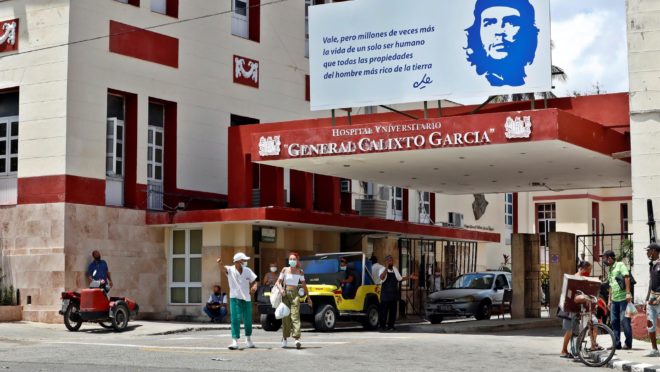COVID-19 pandemic stifles Cuba’s health system
3 min read

Cuba is one of the worst phases of the Covid-19 pandemic, with an average of 8,000 cases and 70 deaths a day, shortages of oxygen cylinders, medicine and doctors, hospital overcrowding and a collapse in funeral services.
The Caribbean nation, with a population of 11.2 million, has the highest incidence of the disease in the Americas, with 1,173 people per 100,000 people infected in the last 15 days, according to the dictatorship’s Ministry of Public Health (MINSAP).
The worst-case incidence data were recorded in three provinces in the western and central regions: Cienfuegos (4877), Ciego de Avila (2882) and Pinar del Rio (1751).
Cienfuegos presents an “unprecedented scenario” due to a lack of diagnostic tests, a backlog of unresolved PCR reports, and “ineffective case management in primary health care,” according to local media. 5 de Septiembre reports that out of 406,244 inhabitants, about 35,000 people have been affected by the Covid-19 virus.
In this province, located 233 kilometers from Havana, the absence of 446 doctors – out of a total of 701 – has flooded care so much that two specialists have to see 250 patients, according to the newspaper.
Doctor from Cienfuegos Hospital I spoke to 14ymedio about the lack of oxygen to treat Covid patients. “These days, 32, 34 patients died. 36 patients died at night, of whom only four were PCR positive. [para coronavírus] moment of death. They are the only ones who are recorded as having died from the Corona virus, but in fact the other 32 were sick after Covid, and they were not counted.”
He also said that the province sees an average of one or two deaths of pregnant women annually, but in the past four days, there has been one death per day, which indicates the severity of the current crisis.
Doctors are getting angry
Cuban doctors have rebelled against the situation in the country, and in recent days groups of Health professionals denounced the unstable health conditions on social networks.
The appearances of doctors, which are rare in a country where health professionals are considered proud of the system and criticism is silenced, prompted the dictatorship of Miguel Díaz-Canel to respond, praising these professionals in the pages of state media, in an attempt. to contain the revolution.
More than 300 burials in 17 days
Ciego de Afila, the capital of the province of the same name 440 kilometers from Havana, has reported 155 deaths linked to Covid-19 in 17 days and 339 interment in its cemetery, more than half of whom are victims of the virus, according to the local newspaper.
Carlos Cano, one of the cemetery administrators, told the publication that the situation is difficult to manage. “It’s not a question of failures in the construction of tombstones and cemeteries, but the number of deaths. We’ve never seen anything like this before,” he said.
Bureaucracy in issuing death certificates, delays of up to four hours in releasing bodies, and other issues exacerbate the sad state of losing a loved one.
The increase in deaths from Covid-19 and the lack of space forced the battalions to do so Expand cemeteries in the country.
Inaccurate death data
Cuba has recorded 4,319 deaths from COVID-19 in the 17 months of the pandemic, but the number could be higher. The official statistics include only people confirmed to have had the virus at the time of death and ignore those who die before being tested.
Cuban Health Minister Jose Angel Portal admitted to the Invasor newspaper that Minsap’s daily report was “inaccurate” in terms of the number of deaths.
Experts also say that many Covid-19 victims die of related illnesses – usually pneumonia – days or weeks after a negative test result, so their deaths from the virus are not recorded.
This protocol is “debatable” for Cuban molecular biologist Amilcar Perez-Referol, who told Effie that COVID-19 is a “biphasic disease”.
First, there is the viral part, where the patient’s examination results appear positive, and then the immune part, when he has diseases related to an unbalanced immune response of the body due to the virus, and the patient can already test negative results, explained the researcher from Universidade Estadual Paulista (Unesp).
However, he noted that in other countries these people are still considered victims of Covid, as their clinical condition stems from having the disease.

“Entrepreneur. Music enthusiast. Lifelong communicator. General coffee aficionado. Internet scholar.”

:strip_icc()/s04.video.glbimg.com/x720/11792055.jpg)

:strip_icc()/s03.video.glbimg.com/x720/11786998.jpg)



